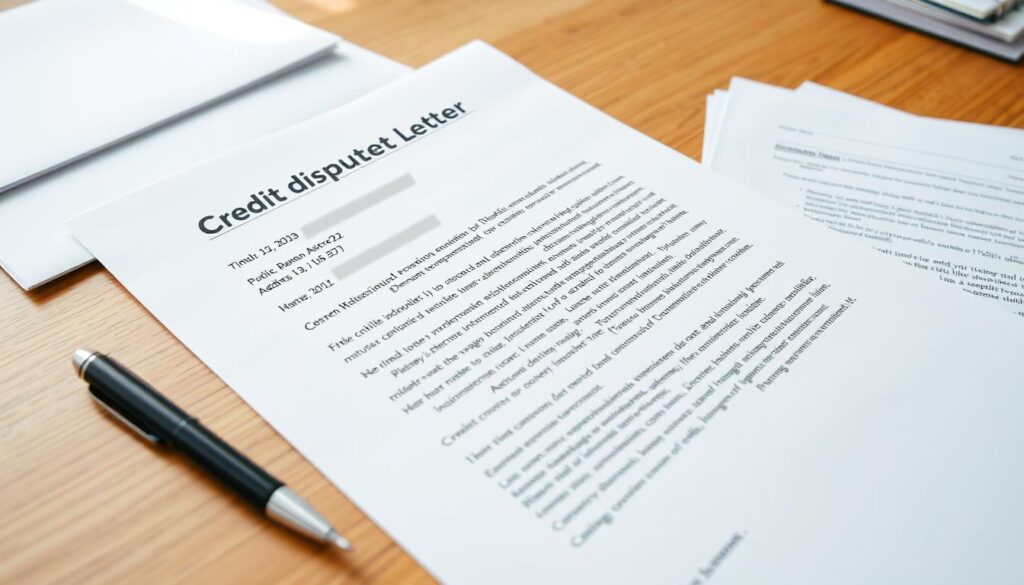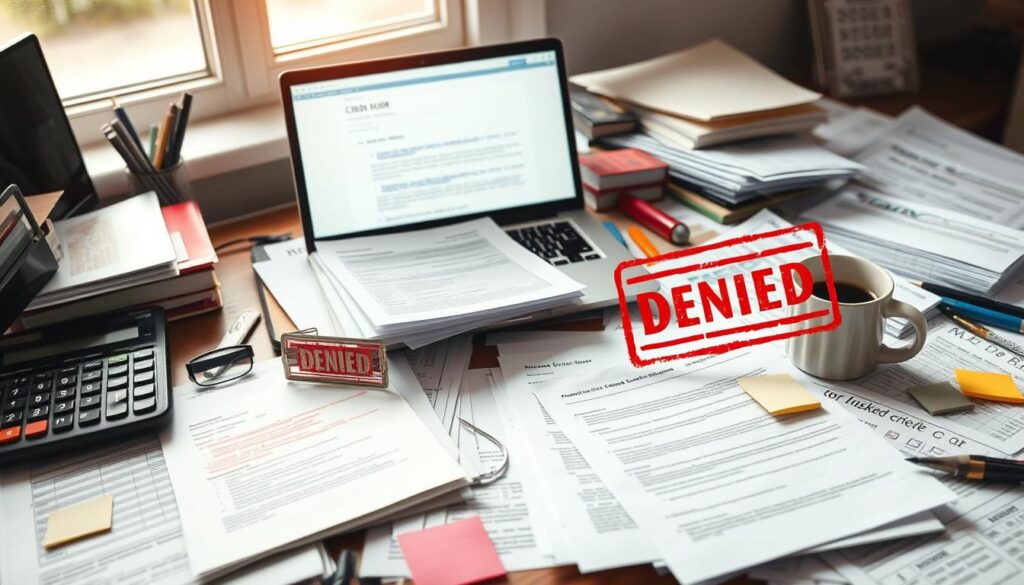Managing your credit report is crucial for your financial health. You can dispute any errors on your credit report. A well-crafted credit dispute letter can significantly improve your credit profile.
This guide will help you draft an effective credit dispute letter. You’ll learn how to take control of your financial future. We’ll explore the key elements of a successful dispute letter.
Key Takeaways
- Understand the importance of credit disputes and their impact on your financial well-being.
- Familiarize yourself with common credit reporting errors and your rights under the Fair Credit Reporting Act.
- Learn the essential components of a winning credit dispute letter, from the opening statement to the specific details of the dispute.
- Discover the process of sending your credit dispute letter and effectively tracking its progress.
- Gain insights on how to respond to credit bureau investigations and handle creditor responses.
Understanding Credit Disputes and Their Impact
A healthy credit score is vital for getting good loan terms and opportunities. Errors in credit reports can hurt your score and cause financial problems. Learning about credit disputes helps address these issues effectively.
Regular credit report checks are crucial. They help you spot and fix mistakes quickly. This proactive approach protects your financial well-being.
Why Credit Disputes Matter
Credit disputes help fix mistakes in your credit report. These errors can make it harder to get credit or good terms. By addressing issues, you can improve your score and financial health.
Common Credit Reporting Errors
- Inaccurate account information, such as incorrect balances or payment histories
- Outdated or stale information, including closed accounts or paid-off debts that remain on your report
- Fraudulent activity, such as accounts opened without your knowledge or consent
- Mistaken identity, where another person’s information is incorrectly associated with your credit profile
These errors can greatly impact your credit score. Regular credit report reviews are essential. Addressing discrepancies through disputes helps maintain accurate records.
Knowledge of credit disputes and common errors is powerful. It helps you protect your credit actively. This approach builds a strong financial foundation for your future.
Your Rights Under the Fair Credit Reporting Act
The Fair Credit Reporting Act (FCRA) empowers you to dispute inaccurate information on your credit reports. This federal law ensures credit bureaus and creditors uphold their responsibilities. It protects your financial well-being during the credit dispute process.
The FCRA grants you free access to your credit reports once a year. You can review reports from Equifax, Experian, and TransUnion. This helps you spot errors or fraud affecting your credit score.
If you find inaccuracies, you can start a credit dispute process with the relevant credit bureau(s). Credit bureaus must investigate your dispute within 30 days. They must provide results in writing.
The FCRA requires creditors and collection agencies to report accurate information. You can dispute inaccurate items and have them removed from your report. This protects your financial profile.
The FCRA also guards against identity theft. You can place a fraud alert or credit freeze on your file. This limits access to your sensitive financial information.
| Key Provisions of the Fair Credit Reporting Act | Your Rights as a Consumer |
|---|---|
|
|
Knowing your FCRA rights helps you maintain accurate credit reports. This knowledge empowers you to safeguard your financial well-being. Take action to protect your credit and financial future.
Preparing to Draft a Winning Credit Dispute Letter
Gathering documentation is key to a successful credit dispute. Identify specific negative items you want to challenge. This preparation will strengthen your case and boost your chances of success.
Gathering Necessary Documentation
Get credit reports from Experian, Equifax, and TransUnion. Review them for any credit report review and spot negative items to dispute. Collect supporting documentation to back up your claims.
Bank statements and payment receipts can prove your credit history’s accuracy. Keep any notices from creditors or credit bureaus about disputed items. Make copies of all documents for easy reference during credit dispute letter preparation.
Identifying Negative Items to Dispute
Look for inaccurate, incomplete, or unproven negative items in your credit reports. These may include late payments, collections, or identity theft issues.
Focus on items that greatly impact your credit score. Note details like creditor names, incident dates, and amounts owed. Gather documentation to support your dispute for each item.
Thorough preparation sets you up for drafting a compelling credit dispute letter. This can help improve your credit report and boost your overall financial health.
Components of an Effective Credit Dispute Letter
A well-crafted credit dispute letter can yield results. It should include an opening statement, personal information, and dispute details. These elements boost your chances of a successful outcome.
Opening Statement and Personal Information
Start with a clear opening statement explaining your letter’s purpose. Briefly mention the items you’re disputing. Include your full name, address, and account numbers for easy identification.
Specific Details of the Dispute
The core of your letter should detail the disputed items. Explain why each item is inaccurate or incomplete. Provide supporting documentation to strengthen your case.
A thorough explanation increases the likelihood of a favorable resolution. Address each item individually with a clear rationale. This approach enhances your chances of correcting errors on your credit report.

| Component | Description |
|---|---|
| Opening Statement | A clear and concise statement that explains the purpose of the letter and the specific items being disputed. |
| Personal Information | Your full name, address, and account numbers to ensure the credit bureau can easily identify your case. |
| Dispute Details | A detailed explanation of the specific item or items being disputed, including the reasons for the dispute and any supporting documentation. |
Addressing the Credit Dispute Letter
Proper addressing of your dispute letter is vital for resolving credit issues. The three major credit bureaus have specific addresses for processing these letters.
Use these correct credit bureau addresses to ensure your dispute letter is delivered to the right place:
- Experian: P.O. Box 4500, Allen, TX 75013
- Equifax: P.O. Box 740256, Atlanta, GA 30374
- TransUnion: P.O. Box 2000, Chester, PA 19016
Sending your letter to the right credit bureau addresses ensures prompt investigation of your concerns. This attention to detail can significantly impact the outcome of your credit disputes.
“Accurate and timely credit reporting is essential for consumers to maintain a healthy financial profile. Addressing your dispute letter properly is the first step towards achieving a fair and just outcome.”
Following the correct dispute letter delivery steps boosts your chances of success. Ensuring your letter reaches the right bureau can have long-term benefits.
Sending Your Credit Dispute Letter
Crafting an effective credit dispute letter is crucial. Send it via certified mail to ensure proof of delivery. This step is vital for potential follow-ups with credit bureaus.
Tracking and Follow-Up
After mailing, track your letter’s delivery actively. Use the certified mail tracking number to monitor its status. Keep a record of the delivery confirmation for future reference.
Stay on top of the dispute timeline. Be ready to follow up if needed. This approach helps ensure your dispute is being processed properly.
Within 30 days of receiving your dispute, the bureaus are required to investigate the items you’ve challenged and provide you with the results. If you don’t get a response, follow up promptly.
![]()
Vigilance is key when dealing with credit report issues. Track your letter’s delivery and follow up with credit bureaus. This increases your chances of removing inaccurate items from your credit report.
credit dispute letter that works
A good credit dispute letter is key to fixing errors on your credit report. You can find sample letters and templates to help you. These examples have helped many people remove wrong info from their credit history.
A strong template starts with a clear opening. It states why you’re writing and what you’re disputing. Then, it gives details about your dispute. Include any proof you have to back up your case.
- Sample Dispute Letter 1: Disputing an Erroneous Late Payment
- Sample Dispute Letter 2: Challenging an Inaccurate Charge-Off
- Sample Dispute Letter 3: Removing an Unverified Collection Account
These dispute letter samples show how detailed you need to be. They help you challenge credit report errors. Use their structure and language to write your own effective credit dispute letter.
| Sample Dispute Letter | Disputed Item | Outcome |
|---|---|---|
| Sample Dispute Letter 1 | Erroneous Late Payment | Removed from Credit Report |
| Sample Dispute Letter 2 | Inaccurate Charge-Off | Corrected on Credit Report |
| Sample Dispute Letter 3 | Unverified Collection Account | Deleted from Credit Report |
Using these dispute letter samples and dispute letter templates can help you. They’ll guide you in writing a strong letter. This can lead to better results for your credit report.
Responding to Credit Bureau Investigations
Here’s the rewritten version of the paragraphs enclosed in p tags:
After sending your credit dispute letter, credit bureaus will investigate the issue. This crucial step lets you provide more evidence to support your claim. Your goal is to convince the bureaus to make necessary corrections.
When responding to investigation findings, have a solid plan. Review the bureau’s response carefully. Understand their specific reasons for the decision.
The key to successful credit disputes is persistence and attention to detail. Provide credit bureaus with compelling evidence. This increases your chances of removing negative items from your report.
Understanding the credit bureau investigation process and timelines is crucial. Submit your dispute response within the required timeframe. Include necessary additional evidence to support your claim.
Dealing with Creditor Responses
Credit bureaus contact creditors to verify information when you file a dispute. Creditor responses play a crucial role in resolving your case. Handling these responses effectively is key to a successful outcome.
Quickly address any debt validation requests from creditors. Gather evidence to prove the debt isn’t yours or that reported information is incorrect. Be ready with payment records, correspondence, or court documents if needed.
Review the creditor’s response carefully. Look for any disputed information that still needs attention. Follow up with the credit bureau if the creditor provides inaccurate or incomplete details.
- Respond promptly to any debt validation requests from creditors
- Gather relevant documentation to support your dispute validation
- Closely examine the creditor’s response for any remaining disputed information
Take a proactive approach to creditor responses. This increases your chances of resolving disputes successfully. It also helps ensure your credit report stays accurate.

Escalating Unresolved Disputes
Unresolved credit disputes require further action. This guide will help you escalate your case. You’ll learn how to file complaints with consumer protection agencies.
Filing Complaints with Regulatory Agencies
If credit bureaus or creditors don’t resolve your unresolved disputes, you have options. You can file regulatory complaints with agencies like the CFPB or FTC. These consumer protection agencies investigate credit-related issues for consumers.
Gather all documentation related to your credit dispute. This includes copies of dispute letters and any responses received. Visit the CFPB or FTC website to find their online complaint forms.
Explain your unresolved disputes clearly. Include steps taken and why you’re unsatisfied with the resolution. Submit your complaint with supporting documentation. Follow up on your regulatory complaints and provide additional info if needed.
Escalating unresolved disputes to agencies asserts your consumer rights. It ensures your credit report accurately reflects your creditworthiness.
“Don’t let credit disputes linger. File complaints with agencies to protect your financial well-being.”
Maintaining Positive Credit Habits
Disputing credit report errors is vital, but developing good credit habits is equally important. Building a strong credit profile takes consistent effort and discipline. Let’s explore some tips for effective credit management.
Pay Bills on Time
Timely bill payments are crucial for a good credit score. Payment history accounts for 35% of your FICO credit score. Pay all bills, including credit cards and utilities, by their due dates.
This practice is essential for credit management and credit building. It shows lenders you’re responsible with your finances.
Keep Credit Card Balances Low
Positive credit habits include maintaining low credit card balances. Aim to keep your credit utilization rate below 30%. This ratio compares your credit card balances to your total credit limit.
Low utilization demonstrates responsible borrowing to lenders. Over time, this can improve your credit score.
Monitor Your Credit Reports Regularly
- Regularly reviewing credit reports helps identify and address inaccuracies affecting your credit.
- You can get a free credit report annually from Experian, Equifax, and TransUnion.
- Regular monitoring also helps detect suspicious activity, like identity theft or unauthorized accounts.
Adopting these positive credit habits helps manage your credit effectively. It builds a strong financial profile and sets you up for future success.

Seeking Professional Assistance
Feeling swamped by credit disputes? Professionals can lend a hand. Let’s explore the benefits of credit repair services, credit counseling, and consumer protection attorneys.
Credit disputes can be tricky for those unfamiliar with reporting laws. Credit repair services offer expertise throughout the process. They review reports, spot errors, and talk to credit bureaus for you.
Need a broader financial approach? Credit counseling services might be your answer. They help with budgeting, debt management, and teach smart credit habits. These pros create custom plans to boost your credit score.
For complex legal issues like identity theft, consult a consumer protection attorney. These experts know the laws inside out. They’ll fight for your rights and tackle any unlawful practices.
Professional help can be a game-changer in credit disputes. With expert support, you’ll navigate the system more effectively. This increases your chances of success and helps rebuild your credit.
| Service | Key Benefits | Potential Drawbacks |
|---|---|---|
| Credit Repair Services |
|
|
| Credit Counseling |
|
|
| Consumer Protection Attorneys |
|
|
Conclusion
This guide helps you craft an effective credit dispute letter. You can reclaim your financial power by understanding your rights. Identifying credit report inaccuracies lets you improve your score and secure a better future.
Healthy credit goes beyond disputing errors. It involves making timely payments and keeping balances low. Regularly monitor your credit reports to maintain good financial habits.
Taking control of your credit protects your consumer rights. It also unlocks opportunities for better interest rates and increased borrowing capacity.
Stay diligent and informed when handling credit disputes. Use the tools and strategies outlined here to navigate confidently. With persistence, you can achieve the credit score improvement you deserve.

